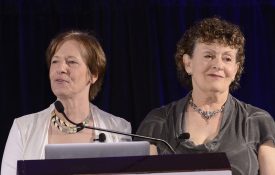-
The Difference Between Speaking and Thinking
Language is commonly understood as the instrument of thought. People “talk it out” and “speak their mind,” follow “trains of thought” or “streams of consciousness.” Some of the pinnacles of human creation—music, geometry, computer programming—are Visit Page
-

Parents Fine-Tune Their Speech to Children’s Vocabulary Knowledge
Researchers have developed a method to experimentally evaluate how parents use what they know about their children’s language when they talk to them. Visit Page
-

Research on Baboons’ Capacity for Speech Sounds Makes International Splash
Having a lower larynx than humans do doesn’t prevent baboons from being able to make human-like vowel sounds. Visit Page
-

Making Science ‘Edible’
Today, parents wanting the best for their children’s intellectual development can turn to a number of “educational” digital apps, a variety of “brain-based” teaching strategies and curricula, and a never-ending stream of videos, toys, games Visit Page
-
Teaching Current Directions in Psychological Science
Edited by C. Nathan DeWall and David G. Myers Aimed at integrating cutting-edge psychological science into the classroom, Teaching Current Directions in Psychological Science offers advice and how-to guidance about teaching a particular area of Visit Page
-
‘Baby Talk’ Is Less Clear Than Normal Speech
People tend to speak more slowly, use a sing-song voice, and use cutesy words like “tummy” when speaking to babies and small children. While we might be inclined to think that this kind of “baby Visit Page

